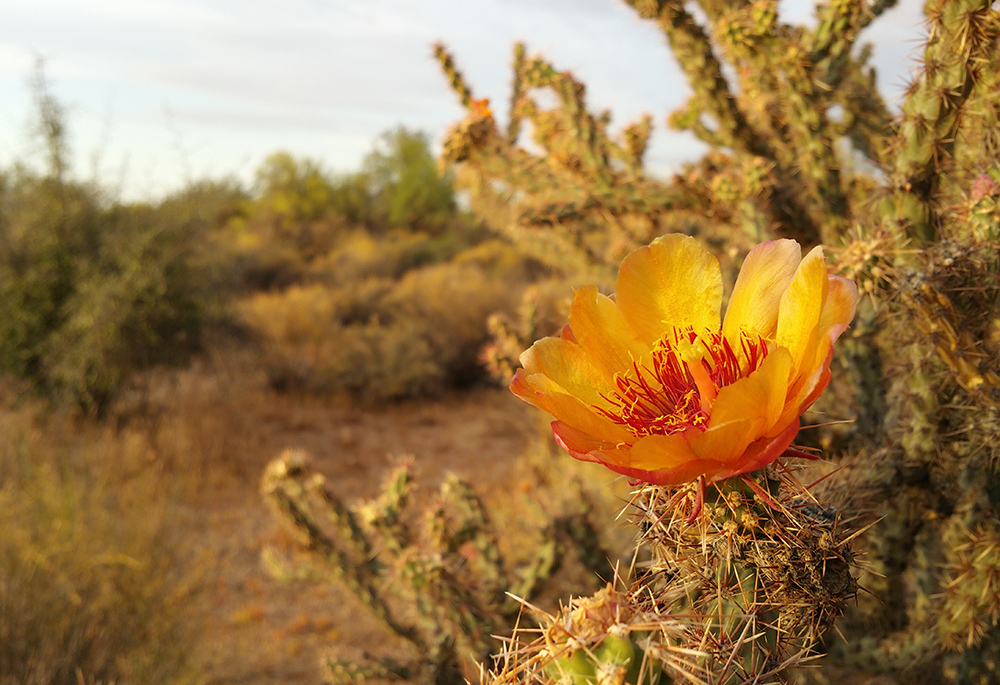
(Unsplash/Daniel Tuttle)
"Lord, hear our prayer." How much thought or emotion do you put into those words at each liturgy? Is it a plea or just a rote response? Perhaps a subtle bit of social justice promotion? A reminder about the parish's sick and dying? Do you really expect prayer to change anything?
Those questions aim at deeper ones such as: What do we anticipate from God in our ordinary, daily life? How do we expect God to exercise power in our world? What results do we anticipate as a result of prayers for peace and justice, for the sick or for refugees?
John the Baptist had questions about Jesus. He knew Isaiah's prophecies. John preached with images of a God who meted out vengeance and reward. He anticipated a savior with axe in hand, ready to incinerate the useless and call out the unrighteous as chaff. John preached as though he were expecting God's wrath to swoop down at any moment. Then, as he languished in prison, he sent disciples to ask Jesus what kind of salvation he was offering — a thinly veiled expression of disappointment
Jesus emphasized an alternative dimension of Isaiah's prophecies from John's. Where John paid attention to retribution, Jesus focused on blind eyes, deaf ears, paralyzed tongues and lame legs. John seemed to envision God's salvation as overturning oppressors on their own violent terms. Jesus concentrated on the needy and how igniting their faith could turn their lives around.
Isaiah prophesied that dry lands would flourish like a fiesta and the wasteland would bloom as if rejoicing. This image depicts a rare, but real, experience when long-dormant seeds are watered by unusual rainfall. Suddenly and for a short time, a desert landscape bursts into a riot of color, with a bounteous beauty garbing an otherwise barren landscape. This is the dimension of Isaiah's message that seemed to catch Jesus' imagination.
John's disciples asked, "Are you the one who is to come, or should we look for another?" Responding, Jesus made no claim about himself. He didn't say, "This is what I have done." Instead, he told them what was happening with the blind, the lame, the lepers, the deaf and the dead. About himself, he simply said, "Blessed the one who takes no offense at me." This beatitude sums up the nine found in Matthew 5. It prods listeners to see things from Jesus' vantage point, to ask how Jesus understood God's way of seeing things.
Of John, Jesus asked only that he not be scandalized. He asked that John not cling to his image of a vengeful God, but to be open to the God of the blooming desert, the God who awakens life's buried or dormant potential. This image of God guided Jesus' ministry. Jesus never took credit for healing people; he told them it was their faith, their trusting openness to God, that made them whole.
Advertisement
John questioned Jesus' message and methods. Jesus replied by telling John what he had awakened in people and how they responded. Isaiah talked about the glory and the splendor of the Lord. Jesus saw God's glory shine forth when feeble hands became strong, weak knees ceased trembling and frightened hearts moved beyond fear. The vindication and salvation Jesus offered individuals was a recovery of wholeness, an authentic and effective faith that the hidden seeds of their potential could bloom beyond their wildest imaginings.
This suggests an interpretation of one of the perplexing phrases we hear in the second eucharistic prayer. We hear the request: "Make holy, therefore, these gifts ... by sending down your Spirit upon them like the dewfall." Science tells us that dew doesn't actually fall. Dew forms in the interaction between the humidity of the air or material and changing temperature. Symbolically, the difference between the image of dewfall and actual dew formation suggests the difference between God acting independently from outside our realm and God calling forth the innate potential of creation — including us!
This Third Sunday of Advent invites us to join John in asking ourselves what we expect of God and, in turn, what God offers and hopes for from us. Are we, with John, waiting for God's intervention? Waiting for God to swoop down to reform or restore everything? Or do we believe that Jesus is inviting us to collaborate with the grace that unleashes our share in divine power so that we and everything around us can rejoice and bloom with our innate potential? Those alternatives might describe the difference between John, the greatest of the prophets, and the least in the kingdom of heaven.
Who and what are we awaiting in Advent?
